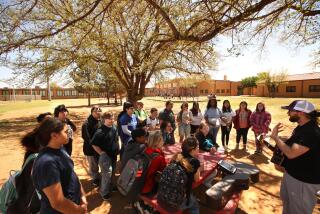Home Schooling Gaining Respect in the Mainstream
- Share via
BOXBORO, Mass. — They form the two flanks of an odd alliance: conservative Christians determined to rear devout and dutiful children, New Age improvisers who believe in free-flow learning.
Uniting such parents, in an inexorably growing movement, is the conviction that they can do a better job educating their children at home than professional teachers can do in America’s public schools.
Twenty years ago, perhaps 10,000 or 20,000 children were home-schooled, and many states frowned on the practice. It is now legal and commonplace in every state; experts estimate that anywhere from 1.3 million to more than 2 million children are involved.
Bridget Barker pulled her daughter, Maggie, out of public school in Portsmouth, N.H., three years ago, after failing to win permission for the girl to work above her grade level. She hopes the growth of home schooling sends a message to those in charge of public education.
“Hello, this is a wake-up call. You need to be doing something different,” Barker said during a recent home-schooling conference in Boxboro. “Putting three-quarters of the students on the honor roll and telling them they’ve done great work when they haven’t--that’s not helping them.”
The motives for home schooling have multiplied. Some parents view public schools as godless or unsafe, breeding unwholesome peer pressure. Others say teachers are too overworked or inflexible to bring out the best in a child. The Columbine High School killings intensified interest in home schooling; so has the recent success of home schoolers in national spelling and geography bees.
For all their diversity, home-schooling families have some common traits. Most are two-parent, middle-class families with a mother willing to devote her weekdays to teaching. Single parents can find the enterprise daunting; two-income couples may not want to sacrifice one salary.
Among the scores of New England families at the Boxboro conference, there was another common denominator: parents spanning the ideological spectrum marveled at how home schooling had fostered a special sense of family togetherness.
“Everyone ought to have at least one year teaching their kids,” said Barker. “It’s a chance for really knowing who your kids are, seeing how they learn, what excites them.”
Maggie Barker, 12, was similarly enthused. Though she likes the sociability of Portsmouth’s public schools and expects to attend a regular high school, she’s excited now about drafting her own seventh-grade curriculum, focusing on English literature and European history.
Glenn and Cheryl Mitchell of Cumberland Center, Maine, had their first taste of home schooling in May, pulling daughter Jen out of ninth grade to finish the semester at home. The experiment went so well that twin sister Julie will join Jen at home for the coming academic year; a third daughter, Kaela, may follow suit.
“We just had this general feeling that our kids were not happy,” said Cheryl Mitchell, who hopes to continue working part-time as a nurse.
“We decided to commit for a year and change our lifestyle, and see how it goes,” she said. “Our lives were stressed out. We want this time to reconnect emotionally and spiritually as a family.”
The Mitchells were in Boxboro to compare notes with other families and learn about ever-expanding curriculum options. These range from on-line courses to group tutoring sessions for advanced subjects that parents feel unqualified to teach.
A festive atmosphere, almost like a country fair, prevailed at the conference exhibit hall. Along one wall, an instructor promoted “archery for home schoolers” as children fired arrows into a target. “Become a rock detective,” suggested a sign at one booth, featuring do-it-yourself geology experiments. Two John Birch Society members touted a summer camp with classes on “The Welfare State” and “Global Tyranny.”
The hall teemed with display tables offering videotapes, audiotapes, brain-twister games, microscopes, storybooks and textbooks. There were Christian biology books denouncing evolution and secular textbooks defending it.
Nationwide, home schoolers account for roughly 2% of the kindergarten-through-high school student population; their presence is greater in some Western states. Colleges are increasingly receptive to home-schooled applicants, although sometimes these students are required to submit extra test results.
Leading defenders of public education tend to be skeptical about aspects of home schooling but generally acknowledge the strength of the movement and the dedication of home-schooling parents.
“We’ve seen data showing those children are doing very well,” said Ginny Markell, president of the National Parent Teacher Assn. “Our concern is any kind of dismantling of the public school system. We think it’s an obligation to make sure that system is adequate.”
Effective home schooling, she said, “is an incredible family commitment in terms of time and money. . . . It’s very much a way of life, one that many families could not manage.”
She noted the boast that home-schooled children receive more individualized attention. “It’s hard to argue that when we have classes with one teacher and 30, 35 kids.”
One of the leading experts on home schooling is Patricia Lines, who tracked the phenomenon for the U.S. Department of Education and is now a senior fellow with the Discovery Institute, a think tank in Seattle. She says home schooling is attracting a cross-section of families who can’t be dismissed as isolationists.
“I’m a public school person,” Lines said. “But if you’re a democracy, you allow people to make choices.”
Periodic Gallup polls indicate that increasing numbers of Americans view home schooling positively, though a 57% majority in the most recent survey still disapproves. The largest teachers’ union, the National Education Assn., asserts that home schooling “cannot provide the student with a comprehensive education experience.”
The NEA advocates aggressive state regulation of home instruction. Bucking public opinion, the NEA also says school districts should not allow home-schooled students to take part in extracurricular activities in public schools.
Paul Houston, executive director of the American Assn. of School Administrators, worries that some states are too lax in overseeing home schooling.
“There’s always the potential for children being hurt or not being educated properly,” he said. “But in my observation, the vast majority of parents who decide to educate their child in that form are pretty high-minded.”
Public schools should work harder to stimulate their students, Houston said. But he believes the schools provide valuable lessons in socialization that are hard to emulate at home.
“If you don’t want your child in public school because of exposure to people who think differently or have different religious values--I think that’s really unhealthy,” Houston said.
“What will America come to look like if everyone ends out in their own little enclaves? . . . It’s a question that really frightens me.”
He recalled seeing a TV segment about home schooling in which the interviewed students seemed unsettlingly polite and demure--”almost like Stepford children.”
“Everything was so perfect,” he said. “What happens in their life when things go wrong?”
Religious values were an overriding factor behind Jane and Warren Andrew’s decision to home-school their six children. The born-again Christians from Bow, N.H., expressed concern about the “humanistic philosophy” prevailing at public schools.
Their oldest child, 14-year-old Christopher, mixes with other young people at church and on sports teams. His curriculum for the upcoming academic year includes geography, Latin, piano, Bible study and money management, linked to a small business he operates from home.
Jane Andrew taught for 10 years in public schools; home schooling, she says, is more fun but more taxing.
“It’s all day and all night,” she said. “You want the best for each one of the children. If I sent them to school, no one there is going to look out for them more than I do.”
Paula Hill, a home-schooling mother of four from Hamden, Conn., said the task doesn’t have to be exhausting.
“If the kids are not in the mood to learn, you can skip it and do it later,” she said. “You only need to teach a couple of hours a day to equal what they do in the public schools.”
Her husband, James, a business development specialist, grew up home-schooled in an overseas missionary family that moved frequently. He has flexible working hours and helps teach his children, who range from 5 to 13.
“The hardest part for whoever stays home, whether the mom or dad, is playing so many different roles,” Hill said. “Parents need to set aside time to be themselves, as an adult.”
The Hills consider family trips to be part of home schooling--short or long excursions that encompass museums or historical sites. At home, they sometimes leave 10-year-old Everett alone to read--”he just pores over books all day,” his mother said.
The results so far, the Hills say, are bright, well-mannered children and a close-knit family.
“Biblically,” observed Paula Hill, “parents are the ones who are supposed to raise their children.”
*
On the Net:
Education Department report:
https://www.ed.gov/databases/ERIC_Digests/ed414683.html
National Home Education Research Institute: https://www.nheri.org
More to Read
Sign up for Essential California
The most important California stories and recommendations in your inbox every morning.
You may occasionally receive promotional content from the Los Angeles Times.













